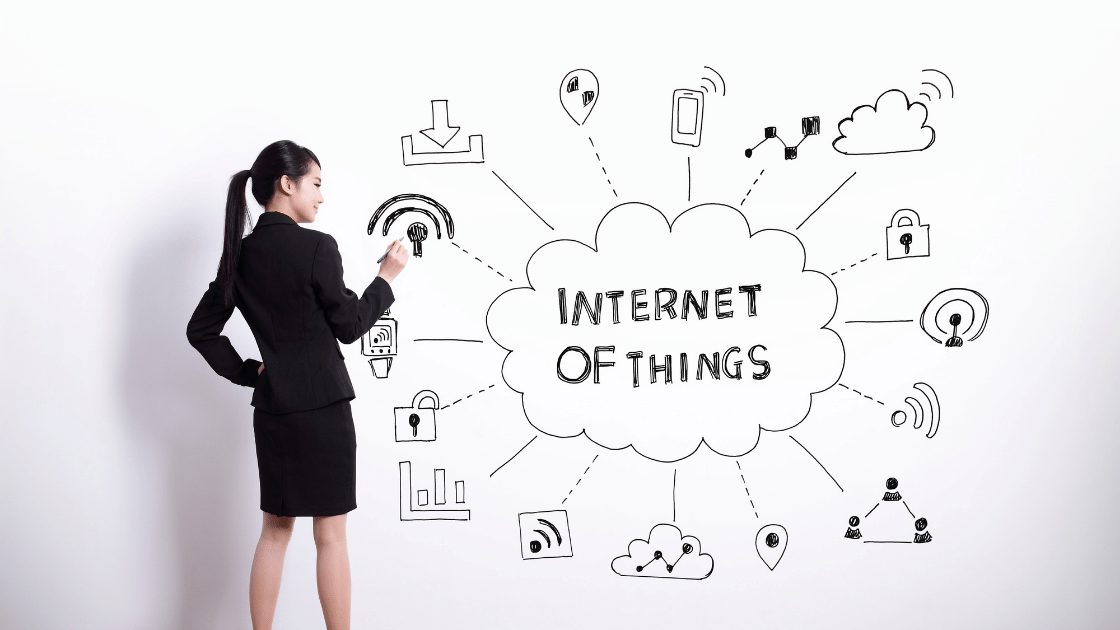Applications of the Internet of Things (IoT) are growing exponentially. From being used in industrial settings to improve efficiency and safety to being utilized in the home for things such as controlling energy use, the IoT is reshaping industries and our daily lives. In this article, we will discuss some applications of the IoT and present specific startup ideas in this fast-growing market.
What is the internet of things (IoT)
The internet of things refers to the growing trend of interconnected devices, which are able to communicate with each other and share data. This interconnectedness is made possible through the use of sensors and microchips, which allow devices to connect to the internet and each other. The internet of things has the potential to revolutionize many aspects of our lives, from how we interact with the world around us, to how we manage our health and wellbeing.
How does the internet of things work?
The internet of things (IoT) includes things like cars, appliances, and even medical devices. They can communicate with each other and with people using a variety of methods, including sensors, apps, and voice recognition. This allows them to do things like share data, receive updates, and even be controlled remotely.
IoT Applications and Startup Ideas
Smart Homes
In the near future, many homeowners will be using “smart homes.” A smart home is one that is connected to the internet and can be controlled by a smartphone or computer. Some of the things that can be controlled in a smart home include the lights, temperature, security system, and even the appliances.
Smart homes are becoming more popular because they make life easier for homeowners. For example, you can use your smartphone to turn on the lights when you get home from work. You can also use your phone to adjust the temperature before you get home so that your house is comfortable when you arrive.
Another advantage of smart homes is that they can save homeowners money on their energy bills. For example, you can set your thermostat to automatically turn off when you leave home or go to bed. This will help you save money on your energy bill each month.
Startup Ideas:
- A home security company that installs and monitors home security systems that use the latest in the internet of things and Smart Home technology
- A home automation company that specializes in installing and maintaining home automation systems, including Smart Home technology
- A home security system that uses sensors to detect when someone is in the home and sends an alert to the homeowner’s phone
- A home automation system that can be controlled with a smartphone or tablet
- A service that helps homeowners
Connected Cars
The latest application of the IoT is in the world of cars. Connected cars are vehicles that are equipped with sensors and other devices that allow them to communicate with other cars and devices on the road, as well as with external servers and databases. This connectivity allows for a wide range of applications, including safety features, traffic management, and car-sharing.
One of the most important applications of connected cars is safety. Car manufacturers are increasingly equipping their vehicles with sensors that can detect hazards on the road, such as other cars, pedestrians, or cyclists. These sensors can then warn the driver of the hazard or even take action to avoid it.
Startup Ideas:
- A service that helps connect car owners with mechanics for on-demand car care
- A platform that helps drivers find parking spots in congested areas
- A service that helps connect drivers with local transportation options
- A transportation management system that uses internet of things technology to optimize traffic flow and reduce congestion on city roads
- A fleet management system for commercial vehicles that utilizes internet of things sensors to improve fuel efficiency and reduce emissions
Smart Cities
The internet of things has brought about a new era of smart cities. Sensors and cameras are being used to collect data on traffic, air quality, noise levels, and more. This data is then analyzed to help city officials make better decisions about how to manage resources and improve the quality of life for residents. For example, sensors can be used to detect when a parking spot is free and then send a notification to the driver’s smartphone. Or, traffic data can be used to adjust the timing of traffic lights. Smart cities are also becoming more sustainable. For example, Copenhagen has installed a system that uses sensors to measure the amount of rainwater that falls on the city’s streets. This data is then used to optimize the city’s irrigation system.
Startup Ideas:
- A service that collects data from various sources within a city, e.g. traffic, weather, public transport, energy use, etc, and provides it in a consolidated, easy-to-use format, for city planners and citizens
- A service that monitors energy use in real-time for businesses and provides recommendations for reducing energy consumption
- A platform for connecting businesses with service providers for smart city initiatives
- A platform that aggregates data from various smart city sensors
Industrial IoT
In the past, factories and other industrial facilities have been largely isolated from the internet. But with the advent of the industrial internet of things (IIoT), these facilities are increasingly being connected to the web, allowing them to share data and communicate with each other.
The IIoT is a network of devices that can collect and share data about how they are operating. This data can be used to improve efficiency, reduce costs, and make factories more sustainable. For example, by connecting machines to the internet, it is possible to detect when they are malfunctioning and correct the problem before it becomes serious.
The IIoT is also being used to create “smart factories” in which all of the machines are interconnected and can communicate with each other. This allows for real-time monitoring of production processes and greater control over manufacturing operations.
Startup Ideas:
- A smart home automation company that sells and installs internet-connected devices in people’s homes
- A cloud-based platform that helps industrial companies track and analyze data from internet-connected machines
- A business that creates a platform for connecting industrial IoT devices to a cloud-based data analytics platform, allowing businesses to track and analyze data from their devices in real-time
Traffic Flow
Traffic flow is a term used in transportation engineering and urban planning to describe the movement of vehicles on a highway or street. Traffic flow is usually studied on a macroscopic level, meaning that the traffic flow characteristics are studied and analyzed at the scale of an entire roadway network. In recent years, however, there has been increased interest in studying traffic flow on a microscopic level, or at the scale of individual vehicles.
The study of traffic flow is important because it can help engineers and planners optimize traffic networks and improve traffic conditions. For example, by understanding the factors that affect traffic flow (e.g., speed, density, and congestion), engineers can design roadways that are better able to handle the volume of traffic.
Traffic congestion is a common problem in many cities. The situation is only going to get worse as the number of cars on the road increases. Some experts have predicted that by 2030, traffic congestion will cost the U.S. economy $5 trillion per year. That’s a lot of money!
There are many possible solutions to this problem, but one of the most promising is the use of technology. For example, sensors and cameras can be used to detect traffic flow and determine where there are bottlenecks. This information can then be used to improve traffic management systems and optimize routing algorithms. Another possibility is the use of the internet of things (IoT).
Startup Ideas:
- A traffic flow monitoring system that utilizes internet of things technology to provide real-time updates on traffic conditions. This could be used by commuters to help them plan their routes, by city planners to optimize traffic flow, and by drivers to find the best route.
- A traffic flow monitoring system that utilizes internet of things technology to collect and analyze traffic data in order to improve traffic flow and decrease congestion
- A system that utilizes internet of things technology to communicate with drivers in order to provide them with real-time information about traffic conditions.
Machine Monitoring
One of the most important applications of machine monitoring is in preventive maintenance. By tracking the performance of machines, operators can identify potential problems before they cause an outage or other serious issue. Predictive maintenance algorithms can help operators predict when a particular machine is likely to fail, so that corrective action can be taken before it causes a problem.
Another key benefit of machine monitoring is improved safety. For example, by tracking the oil pressure and temperature of a machine, operators can ensure that it is running within safe parameters. If a machine begins to run abnormally, operators can take corrective action before something bad happens.
Startup Ideas:
- A business that sells and installs internet-connected sensors in machines to monitor their performance and send alerts when something goes wrong
- A business that provides a platform for businesses to collect and analyze data from internet-connected machines to improve efficiency
- A home security system that uses sensors to detect when a person or object has entered a room and sends an alert to the homeowner’s smartphone
- A machine that can be used to monitor the health of crops and send alerts to farmers when irrigation
Energy Management
As the world becomes more and more digitized, so does the way we use and manage energy. With the advent of the internet of things (IoT), devices are increasingly communicating with one another to optimize usage and reduce waste. In this way, we are able to see real-time data on energy consumption in our homes and businesses and make decisions accordingly.
For example, you can now buy smart thermostats that learn your habits and preferences over time, automatically adjusting temperatures to save energy without compromising comfort. You can also install sensors on light switches, windows, and doors to get alerts when they’re left open accidentally – or even on purpose! – so you can take action quickly.
Startup Ideas:
- A home energy management system that can help homeowners track and optimize their energy usage
- A smart thermostat that can learn a homeowner’s preferences and adjust the temperature accordingly
- A home security system that can also monitor energy usage
- A smart home energy management system that can help homeowners save money on their energy bills by optimizing energy use based on individual preferences and habits
- A real-time energy monitoring system for businesses that can help identify and reduce energy waste, and improve
Efficiency of Factories
In the industrial sector, factories are looking for ways to be more efficient in order to remain competitive. One way that factories are becoming more efficient is through the use of the internet of things. The internet of things allows machines to communicate with each other and with computers. This allows factories to track production, optimize resources, and predict problems. By using the internet of things, factories can save money by reducing waste and improving production times.
Startup Ideas:
- A smart factory that can connect to other factories and optimize production based on real-time data
- A sensor network for factories that can monitor energy usage, production output, and other factors in order to improve efficiency
- Develop a platform that enables factories to connect and share data in order to improve overall efficiency
- Create a service that helps businesses to connect their devices and sensors to the internet of things in order to improve efficiency and automation
Waste Management
The internet of things is helping to manage waste more efficiently. Sensors are being used to detect when a container is full and needs to be emptied, or when a landfill is close to capacity. This helps to optimize the waste management process and prevents overfilling of containers or landfills. In addition, the internet of things can be used to track the movement of waste from collection to disposal, allowing for more accurate data collection and analysis. This information can help improve waste management practices and make them more efficient.
Startup Ideas:
- A waste management company that uses internet of things technology to optimize its operations
- A recycling company that uses internet of things technology to improve its efficiency
- A waste management company that uses internet of things technology to optimize waste collection and routing
- A smart landfill that uses internet of things technology to monitor and optimize waste disposal
- A recycling company that uses internet of things technology to optimize its operation
Safety and Security
As the internet of things (IoT) continues to grow, so does the potential for cyberattacks. While many people view the IoT as a series of connected devices—such as thermostats, lights, and security cameras—the reality is that these devices are interconnected and can be used to access other parts of your network. In fact, a study by HP found that 70% of IoT devices are vulnerable to attack.
To keep your home and business safe, it’s important to take steps to secure your devices and networks. Here are a few tips:
1. Change the default passwords on your devices.
2. Update your software regularly.
3. Use strong passwords and change them often.
4. Install a firewall and anti-virus software on all of your devices.
Startup Ideas:
- A home security system that uses internet of things technology to monitor and protect a property
- A safety app that uses internet of things technology to help people stay safe while they are travelling
- A car security system that uses internet of things
- A home security system that uses internet of things technology to detect when someone is attempting to break into the home
- A safety monitoring system for children that uses internet of things technology to track their location and send notifications to parents if they leave
Customer Engagement
As the internet of things (IoT) continues to grow, it’s more important than ever for businesses to focus on customer engagement. By understanding how customers interact with their products and services, companies can improve customer loyalty, increase sales, and create a better overall experience.
The IoT is constantly changing and evolving, so it’s important for businesses to keep up with the latest trends. One way to do this is by using customer engagement platforms that provide real-time data and feedback. This will help businesses understand how customers are using their products and identify any areas that need improvement.
Another way to improve customer engagement is by using targeted marketing campaigns. By personalizing messages and providing relevant information, businesses can connect with customers on a deeper level. And by tracking customer interactions, businesses can continue to improve their marketing strategies over time.
Startup Ideas:
- A home automation service that allows customers to control all of their home’s electronics from a single mobile app
- A business that creates a customer feedback and/or loyalty platform for small businesses
- A customer service platform that uses artificial intelligence and machine learning to provide recommendations and personalize services
Decision Making
In order to make the best decisions, we need all the information possible. With the internet of things, we can now have access to more data than ever before. We can use this data to our advantage, by incorporating it into our decision-making process.
The internet of things has already started to revolutionize the way we make decisions. For example, imagine you’re a retailer trying to decide whether to stock a new product. You could use data from your sales records to see if there is demand for the product. You could also use data from social media websites to see how people are talking about the product.
This data can be used in other areas of our lives as well. For instance, if you’re considering a career change, you could use data from job websites to see what type of jobs are in demand.
Startup Ideas:
- A home automation company that sells and installs internet-connected devices to control lights, appliances, and security systems
- A data analytics company that uses internet-connected devices to track and report on customer behavior, energy usage, and machine performance
- A business that creates a platform for connecting different internet-connected devices in order to allow them to communicate and share data with each other
- A business that creates a platform for allowing people to make decisions about their lives based on data collected
Healthcare
The internet of things (IoT) is making a big impact on the healthcare industry. By connecting medical devices to the internet, hospitals and other healthcare providers can collect data that can help them improve patient care. For example, by tracking heart rates and blood pressure, doctors can detect early signs of a problem and take action before it becomes serious.
IoT is also being used to improve the delivery of healthcare services. For example, sensors can be used to monitor patients’ movements, so that doctors can ensure that they are getting the exercise they need. And by tracking patients’ vital signs and symptoms, doctors can identify potential health problems before they become serious.
IoT is also being used to reduce costs in the healthcare industry. For example, sensors can be used to monitor how much energy hospitals are using, so that they can reduce their energy bills.
Startup Ideas:
- A mobile app that helps people with chronic conditions manage their health
- A service that remotely monitors patients’ vital signs and sends alerts to doctors if there are any abnormalities
- A platform that helps doctors and patients track their medical history and appointments
Home automation
The home automation market is expected to grow from $154.41 billion in 2021 to $61.62 billion by 2022, according to a report from GlobeNewswire. That’s a compound annual growth rate of 13.3%.
The main drivers of this growth are the increasing penetration of broadband and wireless connectivity, the growing demand for energy-efficient homes, and the increasing demand for smart home devices.
Home automation can encompass a wide range of technologies, including smart thermostats, security systems, lighting controls, and home entertainment systems.
Startup Ideas:
- A home security system that utilizes internet of things technology to provide homeowners with real-time updates on the security of their home
- A home automation system that allows homeowners to control all of the devices in their home from a single mobile app
- A home automation system that can be controlled remotely using a smartphone or tablet
- A home energy management system that allows users to monitor and control the energy consumption of a home using a smartphone or tablet.
Retail and eCommerce
Retail and eCommerce are two of the most important aspects of the modern economy. Retail is the process of selling goods and services to consumers, while eCommerce is the process of buying and selling goods and services over the internet. The growth of eCommerce has been fueled by the development of new technologies, such as the internet of things. The internet of things refers to the network of devices that are connected to the internet, including smartphones, tablets, laptops, and smart TVs. These devices are able to communicate with each other and share data, which allows them to be used for a variety of purposes, including retail and eCommerce.
Startup Ideas:
- A data-driven personal shopping assistant that recommends clothes and accessories based on a customer’s individual preferences and needs
- A home automation company that sells and installs smart home technology, such as internet-connected thermostats, lights, and security
- A smart shopping cart that tracks what items are put into it and sends a bill to the customer’s email address after they leave
Precision Agriculture
Precision Agriculture is a farming management system that uses technology to collect data about crops and the environment. Sensors in the soil can report moisture levels, nutrient levels, and temperature. Images from satellites or drones can be used to identify weeds or pests. Data from all of these sources can be used to create maps that show where crops are healthy and where they need more attention.
Precision Agriculture can help farmers to save money on inputs such as fertilizer and pesticides. It can also reduce the amount of water needed for irrigation. By targetting inputs only where they are needed, precision agriculture minimizes waste and environmental impact.
The future of precision agriculture lies in the internet of things. With billions of devices connected to the internet, it is becoming easier and cheaper to collect data about crops and the environment.
Startup Ideas:
- A service that remotely monitors the condition of agricultural machinery and equipment, providing alerts and recommendations for maintenance and repairs
- A system that uses sensors and machine learning algorithms to automatically identify and diagnose pests and diseases in crops, providing information to farmers
- A precision agriculture startup that creates a platform that helps farmers manage their crops and soil data
- A precision agriculture startup that creates a platform that helps farmers manage their irrigation data
- A precision agriculture startup that creates a platform
Wearable technology
We are quickly approaching a future where wearable technology is the norm. From fitness trackers to smartwatches, people are using technology to help them live healthier and more productive lives. And this is just the beginning. With the internet of things (IoT) becoming more prevalent, wearable devices will only become more common and sophisticated.
One of the most exciting aspects of wearable technology is its potential to help us connect with our surroundings in new and innovative ways. For example, imagine being able to instantly access information about your surroundings through a pair of glasses or a watch. Or being able to control appliances in your home with a simple voice command.
The possibilities are endless, and as wearable technology becomes more popular, the potential benefits for both individuals and businesses will continue to increase.
Startup Ideas:
- A company that creates a wearable device to track your daily activity and caloric intake in order to help you lose weight
- A company that creates a wearable device to monitor your heart rate and blood pressure in order to help you stay healthy
- A wearable device that monitors heart rate, blood pressure, and other vitals, and sends alerts to a doctor or caregiver if there is a problem
- A wearable device that monitors physical activity and calorie intake, and provides feedback to help
Pros and cons of the internet of things
The internet of things has a variety of potential benefits for businesses and consumers. For businesses, the internet of things can improve efficiency and productivity by automating processes and collecting data to help optimize operations. It can also improve customer service by providing real-time information about products and services. For consumers, the internet of things can provide enhanced convenience and connectivity, as well as increased safety and security.
Some potential cons of the internet of things include potential security vulnerabilities, privacy concerns, and system overloads. These issues could arise from the interconnectedness of devices and the large volume of data that could be shared among them. Additionally, the complexity of managing so many devices and coordinating their interactions could create new challenges for individuals and organizations.
The future of the internet of things
The future of the internet of things is shrouded in potential but fraught with uncertainty. On the one hand, devices are becoming more and more interconnected, and on the other hand, security concerns are mounting. The future of the internet of things will largely depend on how these two issues are resolved. If companies can create devices that are both secure and interconnected, then the internet of things will flourish.
In any case, this megatrend is still in its early stages, with plenty of opportunities for startups. The question is, what will you create? How will you take advantage of this new technology?
Peter is a solopreneur in Salzburg, Austria, a husband, and a family father. He runs a little publishing company, and blogs about starting and running online businesses. In his spare time, he enjoys hiking with friends and reading the Bible, and sometimes he takes a trip in his roaring old black 2001 Jaguar XJ8.





